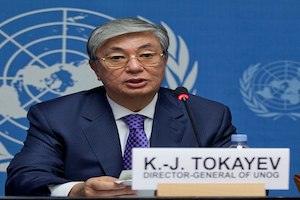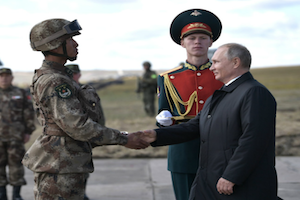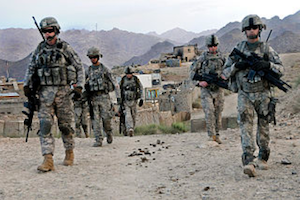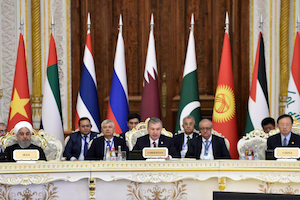Kazakh Anti-Chinese Protests and the Issue of Xinjiang Detention Camps
By Elzbieta Pron and Emilie Szwajnoch
October 31, 2019, the CACI Analyst
On September 21, another wave of popular anti-Chinese protests burst in Kazakhstan’s two main cities – Nur-Sultan (formerly Astana) and Almaty. During the demonstrations, Uyghur protesters joined Kazakh activists and jointly voiced their demands regarding Kazakhstan relationship with China. However, the issue of Kazakhs and Uyghurs detained in Xinjiang camps has been sidelined as a broader agenda has taken charge and the protests been overtaken by emotional anti-Chinese sentiments. While the official Kazakh response to the problem of Xinjiang camps has been very limited, yet the most active among Central Asian states, the collective voice of protesters is hardly going to have any effect on politics.

Russia Moves to Strengthen its Profile in Central Asian Gas Politics, Threatens Trans-Caspian
By Azad Garibov
October 24, 2019, the CACI Analyst
With a promise to increase gas imports from Central Asia and to resume gas purchases from Turkmenistan after a three-year break, Russia’s energy giant Gazprom became increasingly active in Central Asian gas politics in the summer of 2019. This stands in contrast to Russia’s relative passivity in this area over the last decade, as its significantly lowered imports of gas from the region has allowed China to become the dominant player in Central Asia’s gas market. However, Russian gas export to Europe has hit record levels for several consecutive years, implying an opportunity to revive the practice of re-exporting Central Asian gas to Europe.

China-Russia Security Cooperation in Central Asia
By Nurlan Aliyev
October 22, 2019, the CACI Analyst
In August, China and Tajikistan held counterterror drills in Gorno-Badakhshan. Tajikistan’s Defense Ministry stated that the goal of the joint drills was to improve preparedness to counter possible threats posed by terrorist and extremist groups. The “Cooperation-2019” exercise included about 1,200 troops from both sides, including approximately 580 troops from various units and services of the Chinese PLA Western Theater Command. Following China’s substantial involvement in Central Asian economies, Beijing is increasing its military cooperation with the regional states. China’s military encroachment into Russia’s historical “sphere of influence” has nevertheless not led to a visible reaction from Moscow.

Afghanistan Headed for a New Spiral of Violence as U.S. Cancels Talks with the Taliban
By Sudha Ramachandran
October 14, 2019, the CACI Analyst
On September 7, U.S. President Donald Trump announced that he was calling off peace negotiations with the Taliban. The announcement took the world by surprise since U.S. negotiators had said that ongoing negotiations with the Taliban had produced a draft accord only a week earlier. It seemed then that the withdrawal of U.S. troops from Afghanistan was imminent, yet their exit has now been put on hold. In addition to triggering another phase of heightened violence in the war-ravaged country, Trump’s decision could pave the way for an enhanced role for Russia and China in the Afghan peace process.

Impact of the US-Iran Confrontation on Central Asia
By Uran Botobekov
October 3, 2019, the CACI Analyst
Increasing political and economic pressure on Iran, exacerbated by the renewed economic sanctions resulting from the U.S. withdrawal from the 2015 nuclear deal known as the Joint Comprehensive Plan of Action (JCPOA), has led Tehran to seek support from the two major Eurasian political and economic powers Russia and China. Iran has also increasingly turned its attention toward its neighbors in Central Asia, which remain closely integrated into the political, economic and military projects of Moscow and Beijing. Central Asian leaders are well aware that a possible armed conflict between the U.S. and Iran would adversely affect Eurasian security.



